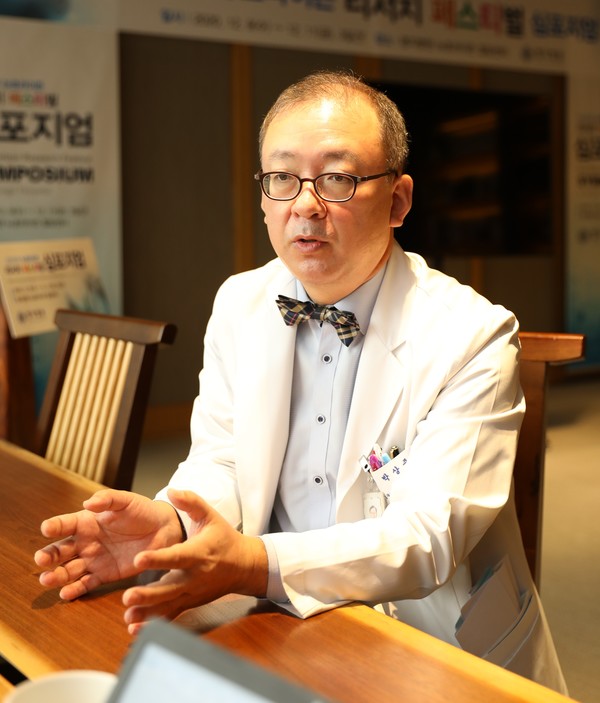“We will not only focus on research but come up with technologies and products applicable in real clinical settings.”
Park Sang-joon, vice president for research at Myongji Hospital, said this and other remarks on the hospital’s R&D strategy at the “2020 New Horizon Research Festival,” hosted by Myongji Hospital from Dec. 11 to Dec. 13. Park is also a clinical professor at the pulmonary and critical care medicine division of the hospital.

The hospital organized the research festival to establish its vision as a research-centered institution and promote communication.
Strictly complying with the government’s social distancing rules, lectures went online, and exhibitions and briefings limited the number of attendees. Lecturers shared the latest knowledge in the healthcare industry, including digital healthcare, the discovery of biomarkers and development of natural substance-based functional materials in the “-omics” era, and anticancer immune cell therapy.
The festival was extraordinary because it gathered not only research institutes run under the hospital but related biotech companies. The participating research institutes included New Horizon Cancer Institute and those studying Alzheimer’s disease, microbiome, rheumatology, natural substances, Nano-IT convergence, and bioengineering. Companies had MJ Cellbio, MJ Brain Bio, MJ Microbiome, and CancerRop.
Park picked three keywords that will shape the landscape of future medicine – immunotherapy, dementia, and microbiome.
“To advance in these areas, Myongji Hospital has established research centers for anticancer, Alzheimer's, rheumatology, and bioengineering, as well as the New Horizon Cancer Institute in the hospital. The hospital also runs venture companies that are matching to the research,” he said.
The latest event aimed to share research results and the procedures of the developments leading to tangible outcomes, he added.
The hospital has been “building pillars” to establish itself as a research-oriented institution for the past three years. The festival was to share the process and achievements among hospital staff, Park said.
“A study’s best outcome would be to provide practical help for patients. In this sense, commercialization is important,” Park said.
As the medical staff knows unmet needs the best, the hospital is the optimal place to test beta products, he further explained. “So, it is most efficient for a hospital to conduct research, and Myongji Hospital is trying to do so.”
Park admitted that Myongji had some weaknesses compared to other leading biotech firms or medical institutions. However, the hospital was going in the “right direction,” and all the hospital needed was a commitment to continuous research and the solidarity of researchers and all staff members.
It has been only three years since Myongji declared its vision as a research-centered hospital. Still, the hospital has made noticeable progress in some research, according to Park.
“The hospital has achieved the most progress in the field of immune cell therapy,” he said. The Cancer Institute is studying “ROP-T” and “Fast-IVS,” which are expected to overcome existing anticancer immune cell treatments' limitations.
MJ Cellbio is developing CAR-T cell therapy and immune cell therapy for various types of carcinomas. Some of the CAR-T cell studies have reached animal testing, Park explained.
Since last year, the Alzheimer’s disease research institute at Myongji has been working to find characteristic genes related to dementia diagnosis and testing them with a diagnostic kit.
Myongji is also pushing for active collaboration with researchers outside the hospital.
“While making the most of our assets, we also plan to conduct joint research with external researchers through open innovation,” Park said. “We’re discussing this with leading researchers. We also consider establishing extra research facilities.”
Although many ongoing studies are still in the early stages, the hospital will wait for a time where such research turns into real outcomes, Park said.
“To do so, we will continue to invest and spare no effort to hire more researchers,” he added.

